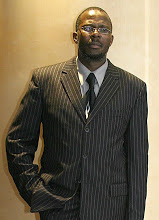Was the civilised world kept informed 'impartially' about the worst interstate crisis currently taking place in the Darfur region?
Was the conflict serving any interest to the present Western Capitalism or neo-loberal agenda?
Was the Darfur crisis intensified to satisfy or serve the interest of the Western Europe or the interests of the Middle East region?
Was the crisis 'tribalised' to divide the Darfur population, if so, who stand to benefit in the crisis?
Mahmood Mamdani radically alters our understanding of the crisis in Darfur through the well-researched analysis by an African-Arab person from East Africa who was also taking pain over the tragic developments in that region.
Mamdani's recently-launched book 'Saviours and Survivors' (Darfur, Politics and the War on Terror) attempts to explain how the conflict in the Darfur began as a civil war (1987-89) between nomadic and peasant tribes over fertile land in the south that was triggeredby the severe drought that had expanded the Sahara Desert by more than sixty miles in forty years.
Mamdani explains how British colonial officials had artificially "tribalised" Darfur.
He explains how the Britons 'divided' Darfur populations into 'native' tribes and creating homelands for the former at the expense of the latter.
Presently there is warrant of arrest against the Sudanese President Omar Al-Bashir issues by the International Criminal Court.
Must we stop complaining about the ICC targeting African leaders as all the ICC does is aimed to implement the values on justice and the respect for law and human rights.
Was the Western world confusing the victims to the perpetrators, if so, according to whose standards do we regard the violations of human rights.
Recently, political correspondent Peter Fabricius cited South Africa's Deputy Justice Minister Andries Nel's speech to the African Union whereby there was a call made about the pivotal role of neo-liberalism played in addressing human right issues in the continent.
The pertinent question to be posed to the outside world is to fully understand the factors that militate for or against the continuation of the crisis.
He (Mamdani) unpacks in broader detail how the Darfur 'civil war' intensified in the 1990's when the Sudanese governmemt tried unsucessfully to address the problem by creating 'homelands for tribes' without any consultative arrangement.
As political historians we have to look at how the involvement of opposition parties gave rise in 2002 to two rebel movements.
Does the World Health Organisation and the Human Rights Watch have any merits in declaring the strife torn Sudan as a 'genocide' ?
Mamdani disputes this assessment but does describe what is taking place there to have lead to 'brutal insurgency and a horrific counterinsurgency'.
Documented historical records do explain that the civil war in Sudan could be traced to the twenty-year civil war the country had with the neighbouring Chad.
Accordingly, this civil war had created confrontation between Libya's Muammar al-Gaddafi who was supported by the Soviet Union and the United States under the Ronald Reagan administration, coupled with the proxy involvement of France and Israel.
The central question therefore is what informed that powerdul Western lobby to declare Darfur as a 'War on Terror' two years after the 11/9/2001?
Outlining his book personally at the Ike's Books recently, Mamdani said his book focuses on three main issues that were salient in 2003 when he began to research the book.
He said there was a movement in advocacy, in particular, the 'Save the Darfur' campaign taking in the United States.
He also looked at the length of the 'marketing and the sensationaliation' the Darfur crisis was gettng full length coverage in the mass media in the Western world.
However, Mamdanmi noted, his book was concerned about the alternative conflict in Darfur and about how it was framed?
Mandani asks what is to be done , what is the way forward about Darfur?
"We need to focus at how we have been able to tackle crisis of similar of worst character in the region, and why do we treat Darfur differently, and why do we treat Darfur in a separate manner to all the crisis we've seen in Africa? " asks Mamdani.
Mamdani adds that the majority of people who have died in Darfur,say 70%, were never killed by insurgents but died of drought, diarhorea and all other common or preventable diseases.
Mamdani questions the role played by the WHO and accusses it of playing a dubious role in reporting the Darfur Crisis to the wider international media.
"As a matter of fact, the Darfur Crisis is a worst human disaster but I suggest we take all the figures supplied by the international NGO's with a pitch of salt as they frame death figures in order to get more funding" cautioned Mandani
Saturday, June 27, 2009
Subscribe to:
Comments (Atom)


